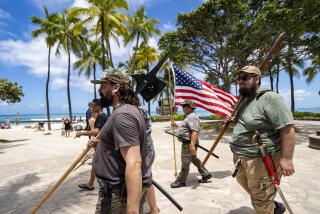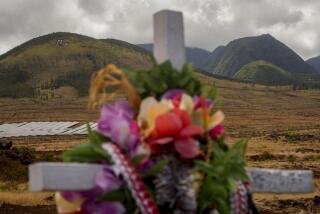Kauai Killings Remind Women That Avoiding Danger Is Up to Them
- Share via
When Carollynn Bartosh of Los Angeles went to Kauai in September to celebrate her birthday, the greeting wasn’t the traditional flower lei.
Upon checking into a hotel with her husband, Blake, she received a notice from the management advising them to lock their doors and avoid the beach at night. The clerk at the front desk told them two women had been killed and another assaulted in the past six months in that area.
The couple stayed at Waimea Plantation Cottages, the only resort on the isolated southwest side of the island, for three nights, but Carollynn Bartosh said, “I was fearful while I was there and didn’t sleep well.”
When I visited Kauai in January, I did not know about the crimes either. If I had, I wouldn’t have ventured alone to some of the same beaches where victims’ bodies were found, like wild, undeveloped Polihale State Park at the end of Highway 50.
Kauai has traditionally been one of the safer Hawaiian islands, though its violent crime rate rose in the first six months of last year, according to the state’s semi-annual crime summary.
On April 7, 2000, the body of Lisa Bissell, a 38-year-old local resident, was found on a rutted sugar cane road near Polihale Beach in the state park. On May 22, a 52-year-old woman was beaten, stabbed and sexually assaulted at a home near Kekaha, where she was a caretaker.
She survived the attack. On Aug. 30, the body of Daren R. Singer, 43, who lived on Maui but was camping alone on Kauai, was found at Pakala Beach, a surf spot near Waimea.
And then the killings stopped.
All three victims were middle-aged women of slight to medium build, with light hair, said Wilfred Ihu, deputy chief of the Kauai police department. All were killed or assaulted on the southwest side of Kauai, within about 10 miles of one another, and each case involved beating, stabbing and sexual assault.
Police said it is unclear whether the crimes are the work of a serial killer.
Mark Safarik, a special agent involved in the behavioral assessment of serial killers for the FBI’s National Center for the Analysis of Violent Crime in Quantico, Va., said a serial killer is usually defined as someone who has killed at least three times, with an emotional “cooling-off” period after each crime that could last days or decades.
Because the investigation (in which the FBI is assisting) is continuing, Safarik would not comment directly on the Kauai case or label the perpetrator a serial killer. But he said the absence of further similar incidents since last summer could signify several things, including a serial killer’s resting period.
Local businesses funded a $25,000 reward for information leading to the arrest of the perpetrator. But the reward remains unclaimed, said Beth Tokioka, public affairs assistant to Kauai Mayor Maryanne Kusaka. ‘Kauai is a very small town where people don’t like to talk about each other,” Tokioka said.
Meanwhile, Kauai has mostly returned to normal.
“Something terrible happened on this island, but because there hasn’t been a recent occurrence, people have gotten on with their lives,” said Sgt. James Kurasaki, who works at the Waimea police substation.
But Safarik said the halt in the slayings “wouldn’t make me feel any better.”
And Sue Kanoho, executive director of the Kauai Visitors Bureau, warns vacationers and islanders alike against being lulled into a false sense of security. “Kauai is such a sweet little place that people think it’s immune to the kinds of problems that plague other destinations,” she said. Even on Kauai, travelers should lock their doors, avoid deserted beaches at night and safeguard their valuables, she said.
I took such precautions when I was on Kauai because I always do. Still, I wish I’d known about the killings. Bartosh said she’s thankful that the management of Waimea Plantation Cottages told her, though it put a damper on her vacation. The resort has stopped issuing warnings because the crimes seem to have ceased.
So whose responsibility is it to tell visitors about such dangers? The U.S. State Department issues consular information sheets and warnings on security matters in foreign destinations. But that doesn’t help domestic travelers.
“You’d be hard pressed to find a travel agent or tourism board likely to say something,” said Kent Brown, executive director of Pinkerton Global Intelligence, an Arlington, Va., company that monitors security around the world, mostly for corporate clients.
Mary Ann Viverette, a vice president of the International Assn. of Chiefs of Police in Alexandria, Va., suggests that local police departments should get the word out at the airport.
“If women can be warned, I would. There comes a time when there’s a greater good,” said Viverette, who also is police chief in Gaithersburg, Md.
I was angry when I learned about the crimes on Kauai. Someone should have told me not to go alone to Polihale Beach, I thought. But now I see the experience as a reminder that my safety is no one’s responsibility but my own.
More to Read
Sign up for Essential California
The most important California stories and recommendations in your inbox every morning.
You may occasionally receive promotional content from the Los Angeles Times.













